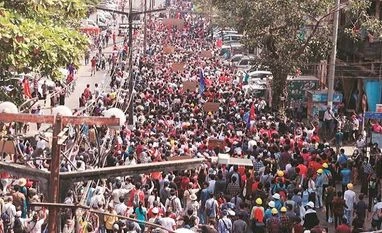Myanmar’s political upheaval is prompting global companies from Japan to Thailand to dial back operations in the country, spurring concern about a widening business fallout.
From beer maker Kirin Holdings Co. to an early backer of gaming firm Razer Inc., companies and investors are weighing the impact of a military coup that’s thrust the once- thriving nation into a state of emergency. The turmoil is prompting multinationals like Thailand’s biggest industrial developer to delay investment plans, a harbinger of things to come should the chaos deepen.
Western nations are applying pressure on the newly installed military government of the Southeast Asian country, once regarded as greenfield territory for everything from oil and gas to leisure resorts. With the U.S. reiterating plans to renew sanctions, it could cause a rippling effect among businesses, threatening $5.5 billion in foreign investment in a country that just a few years ago was on the path to democracy.
“It will definitely get bigger as these corporations get on board the leave-first-and-ask-questions-later bandwagon,” Justin Tang, head of Asian research at United First Partners in Singapore.
Myanmar has been attracting more outside investment in recent years after posting double-digit economic growth in the early part of the last decade. Bordering the massive markets of India and China, Myanmar has abundant natural resources, including oil and gas, gold, silver and precious stones. The population of about 57 million people is greater than South Korea’s, and not far off Italy’s.
Among recent foreign deals, CVC Capital Partners reached an agreement in December to buy Myanmar’s biggest telecommunications tower company for close to $700 million. The deal for Irrawaddy Green Towers Ltd. is the second-biggest for the country, trailing only the acquisition of the Myanmar Distillery group by a unit of Thai Beverage PCL.
Nations with the most at stake from the instability include Singapore, Myanmar’s largest foreign investor, accounting for almost 34% of approved investment by dollar value, according to a World Bank report in December. Yoma Strategic Holdings Ltd., a Singapore-listed conglomerate that gets almost all its revenue from Myanmar, has plunged by a third this year.
Singapore is monitoring the situation closely, said a spokesperson for Enterprise Singapore, a government agency that helps companies grow overseas.
The turmoil is creating a rippling effect across industries. Kirin ended its joint-venture partnership with the nation’s largest brewer Myanma Economic Holdings Public Co., which has ties to the military. The company isn’t planning to entirely exit the country, where its operations accounted for just 1.7% of revenue in 2019.
Lim Kaling, the founding investor of Singapore-based gaming firm Razer, is disposing of his one-third stake in a joint venture that owns RMH Singapore Pte Ltd. RMH owns 49% of Virginia Tobacco Co. in Myanmar, while Myanma Economic Holdings Ltd. -- owned by the military -- holds the balance. “I hope for a time when I can be an investor in the country and its people once more,” Kaling said in a statement on Monday.
Amata Corp. Pcl, one of Thailand’s biggest industrial land developers, delayed some investment plans after it won approval from the government to proceed on several projects.
“The investment outlook of Myanmar doesn’t look good,” Viboon Kromadit, the company’s chief marketing officer, said last week. “Possible sanctions by the international community will definitely affect foreign companies’ confidence.”
Company Boycotts
Singapore-listed energy company Interra Resources Ltd. may face labor disruptions at the Chauk and Yenangyaung plants due to the protests, the company said in a filing to the Singapore Exchange.
Rights groups have called on a boycott of companies believed to be owned by the country’s military. There are 134 companies owned by two of Myanmar’s military-run holding firms -- Myanma Economic Holdings and Myanmar Economic Corp. -- according to data compiled by Bloomberg.
The unrest will lower the country’s economic growth this fiscal year to 3%, from a previous estimate of 4.5%, according to estimates from Malaysia’s Malayan Banking Bhd.
“A military coup has dealt a severe blow to Myanmar’s economic recovery and political stability,” economists Linda Liu and Chua Hak Bin said in a note. Investment “will likely fall given heightened uncertainty and freeze on fresh investments from Western countries.”
Companies adopting a wait-and-see approach include:
Thailand’s energy company, PTT Exploration & Production, is closely monitoring the political situation but doesn’t expect the internal strife to affect its operations or plans, senior vice president for finance Orachon Ouiyamapun said at an investor presentation on Tuesday.
Australian & New Zealand Banking Group Ltd. said it has a small presence in the Southeast Asian country and is monitoring the situation closely, a spokesperson said.
Singapore’s Oversea-Chinese Banking Corp.’s branch continues to operate in the country, said Patrick Chew, head of operational risk management.
Chinese investors, on the other hand, could benefit from the upheaval. They tend to have a higher risk tolerance compared with those from other regions, according to an analysis by Fitch Solutions Country Risk & Industry Research. That means there’s a “chance they may take the opportunity to expand their reach in the country as other investors stay cautious.”
Armed Myanmar group seeks asylum in India
Myanmar-based armed insurgent group Chin National Army has sought asylum for their families in India in the wake of the military coup in the neighbouring country, an official in Mizoram said on Wednesday. The CNA, the armed wing of the Chin National Front, has sought asylum for 40 families, Mizoram's Champhai district deputy commissioner Maria CT Zuali told news agency PTI.
Unlock 30+ premium stories daily hand-picked by our editors, across devices on browser and app.
Pick your 5 favourite companies, get a daily email with all news updates on them.
Full access to our intuitive epaper - clip, save, share articles from any device; newspaper archives from 2006.
Preferential invites to Business Standard events.
Curated newsletters on markets, personal finance, policy & politics, start-ups, technology, and more.
)